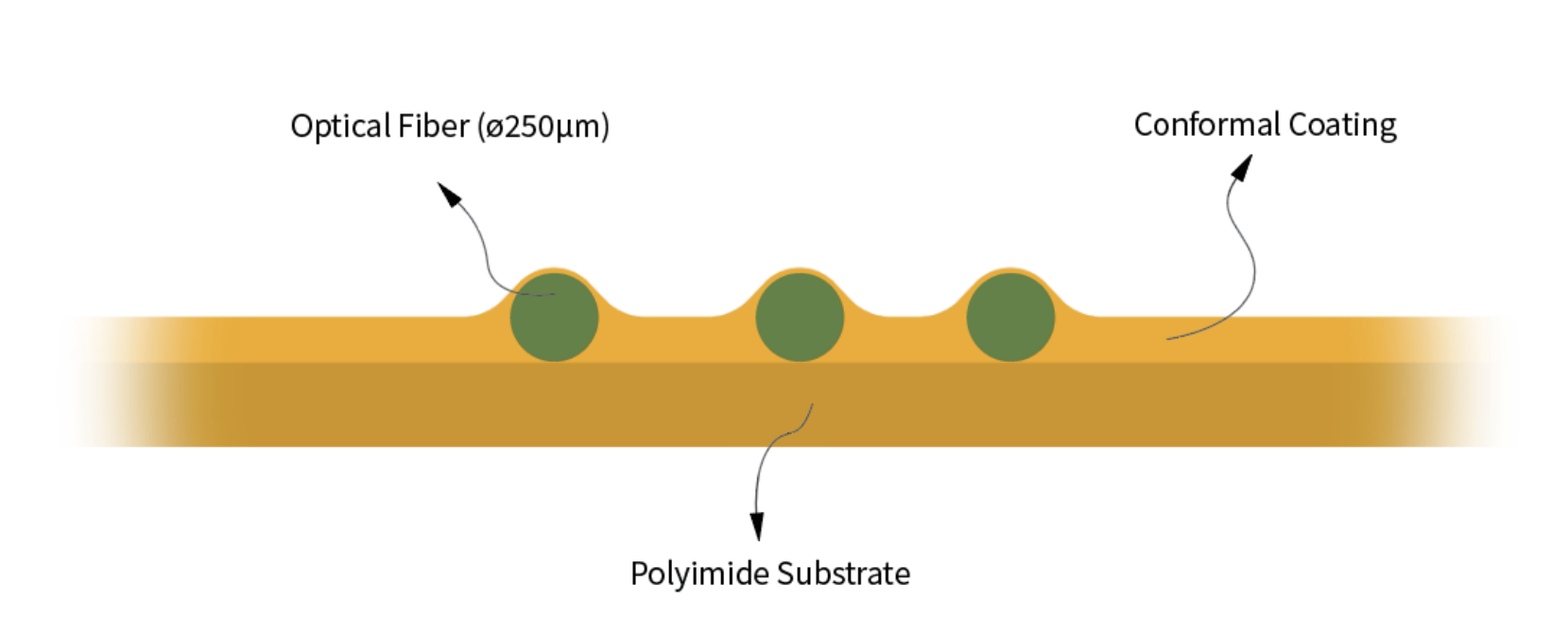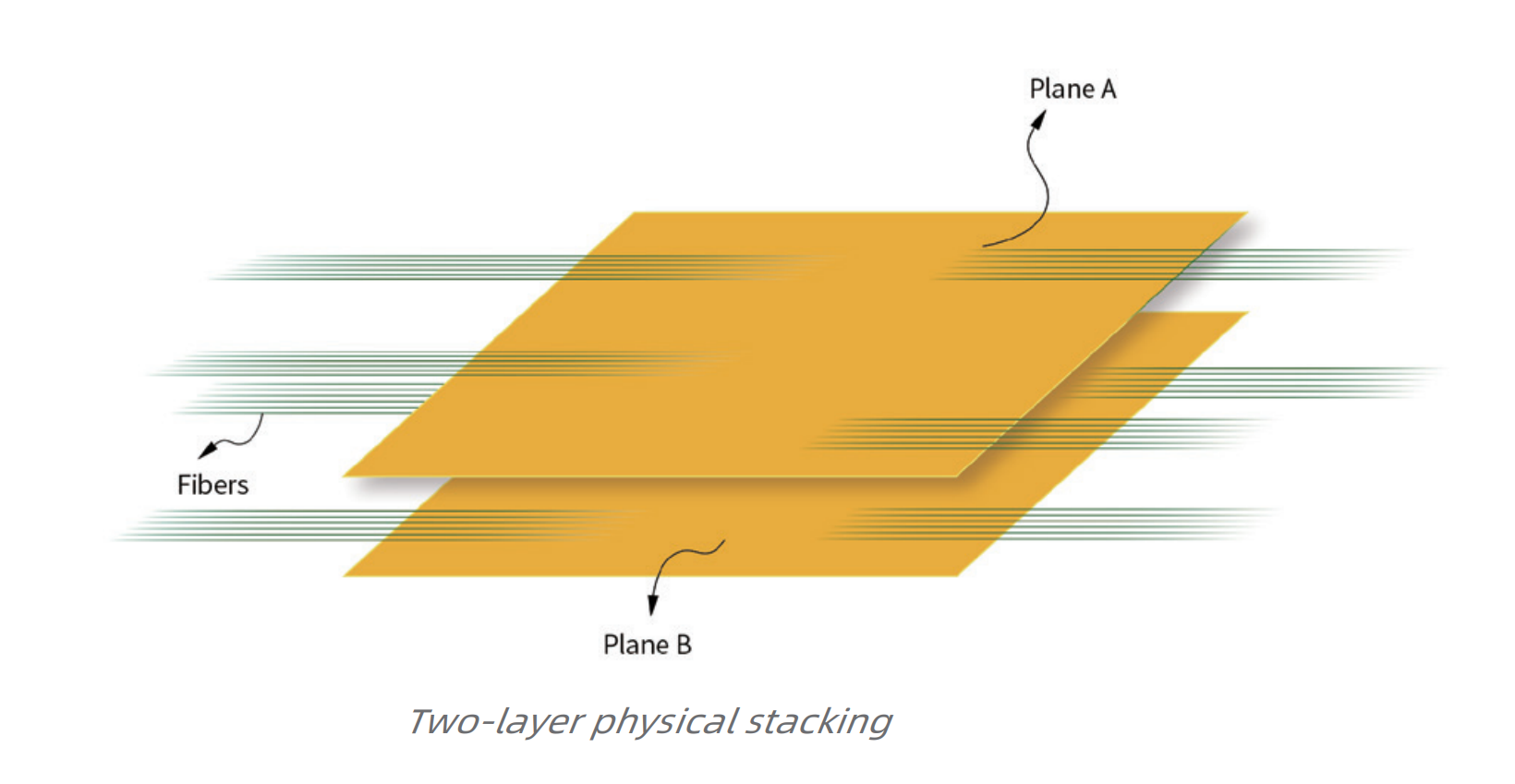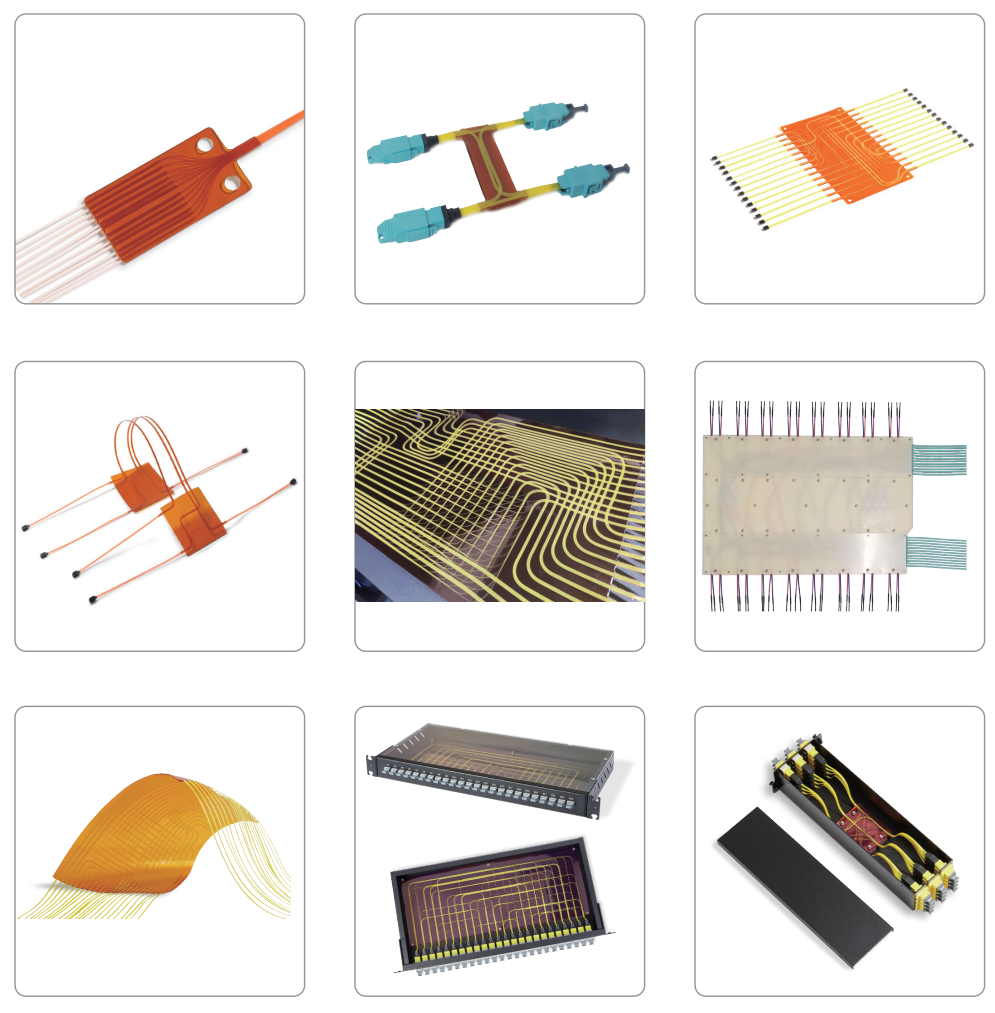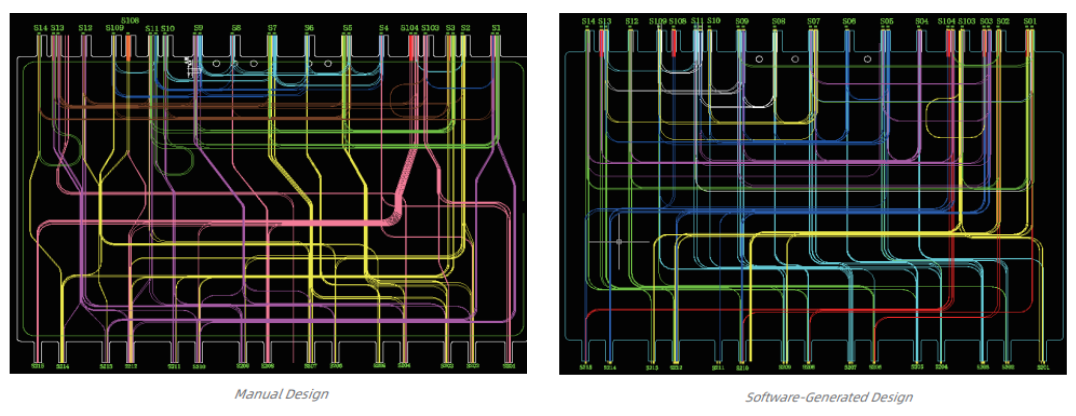——High fiber count, small form-factor and fully customizable fiber optic flex circuits for data center, supercomputing center, and rugged applications.

In today's communication industry, the demand for smaller, lighter, and faster solutions continues to grow, driving the widespread adoption of fiber optics, especially in advanced systems. Meeting these demands requires high-density, robust, and versatile cable assemblies that offer design engineers the flexibility to maximize performance within minimal space.
The Fiber Optic Flex Circuit (FOFC) addresses the need for effective cable management, enabling optimal airflow and efficient routing within communication systems. It provides a streamlined solution for routing fiber from board-to-board, shelf-to-shelf, or within narrow and irregular spaces, ensuring organized and compact fiber pathways.
Flexibility is the key to simplifying system designs. The FOFC can be customized to support virtually any routing configuration, whether point-to-point, shuffle, or set patterns, tailored to meet specific application requirements. Each FOFC is fabricated based on precise design files and technical specifications, ensuring a compact and efficient fiber network layout. Constructed from high-quality polyimide and conformal coating adhesives, it delivers reliable protection for the fiber, meeting the rigorous demands of industrial and aerospace environments.
Applications
Aerospace
Telecommunications (Hubs, Servers Routers, Switches)
‐ Optical cross-connect (OXC)
‐ Card to card
‐ Intra-rack fiber management
‐ High density fiber management
‐ Flexible optical harness, breakouts and shuffles
‐ CPO Optoelectronic integrated package
‐ Backplane interconnection assemblies
Product Structure
The flexible optical fiber circuit consists of four key components: adhesive substrate, optical fiber, coating, and termination connectors. Each of these elements can be customized to meet specific requirements, including substrate size, shape, fiber type, channel count, fiber routing options, connector type, and optical cross-relationships.
Our flex circuits can be terminated with a wide variety of industry-standard connectors, ensuring compatibility and reliability. All flex circuits produced at T&S undergo rigorous testing, providing system designers with a dependable plug-and-play solution. Additionally, unterminated flex circuits are available, allowing customers to add optical termination at a later date.

Circuit sizes range from a few millimeters in width to large, complex flat sheets measuring up to 1240 square inches( 800mmx1000mm).
Flex Circuit Stacking
1. Physical Stacking
To maintain flexibility, it's generally recommended to keep the number of stacked layers to fewer than five. However, if higher channel density is required, flex circuits with five or more stacked layers can also be provided.

2. Integrated Stacking
For complex fiber routing scenarios, where precise cross-connections are needed, integrated stacking offers a more effective solution. This approach treats all layers as a unified structure, enabling a more intricate re-arrangement of fibers across layers to accommodate sophisticated optical.
.png)
These stacking techniques provide flexible options to meet diverse application needs, whether the focus is on maximizing fiber density or achieving advanced cross-connections in high-performance systems.
Leading-out Forms
Different applications necessitate various leading-out forms. We currently offer the following options, and additional customized types are available upon request.

Features
1. Simulation and Optimization Suggestions
The software simulates and calculates fiber-laying losses and other key influencing factors to provide practical optimization suggestions for original optical routing design.
2. Position Accuracy
Fiber positioning accuracy on the substrate is maintained at ±0.01 mm.
3. Customization
Substrate size & shape
Bypass holes and positioning holes
Fiber route
Connector termination
4. Hash Tests
Comprehensive testing over 1000 hours includes:
1. Temperature and Humidity Test: 85°C / 85% RH
2. Thermal Cycle Test
3. High Temperature /Low Temperature Storage Test
ΔIL≤0.3dB in Rapid-Rate Thermal Cycle Test (Change Rate: 10℃/min)
Specification
1. Termination
MTP, MPO, MT ferrules
LC, SC and other connectors
VSFF Connector: MXC, MMC, MDC, CS, SN
2. Materials
Fibers: Single-mode, multimode
Fiber Diameter: 250μm and specialized fibers
Optical Fiber Protection: Conformal coating
Substrate: Polyimide
3. Operating Temperature
-40°C to +85°C
4. Size
Maximum size: 800 mm X 1000 mm
Substrate size tolerance: ± 3mm
5. Optical Performance
0.1dB loss (excluding connector losses)
Product Forms and Configurations

Optical Fiber Routing Software
——Advanced Fiber Routing Software for Complex Circuitry Design
T&S's patented fiber routing software empowers designers to create highly complex fiber circuitry designs with precision and efficiency. Equipped with a set of strict design rules and advanced algorithms, this tool supports nearly any fiber routing scheme, accommodating diverse substrate shapes and specific fiber positioning requirements.
The software's fiber management capabilities effectively handle micro-bending, macro-bending, and crossover stress in intricate routing configurations, significantly enhancing the long-term reliability of the fiber network and minimizing signal attenuation. Delivering optimal designs in just minutes, this software dramatically boosts efficiency and improves production yields compared to traditional manual design methods. By reducing the uncertainties of manual processes, it ensures more consistent and reliable results. Additionally, its simulation function enables customers to further refine and optimize their initial optical routing designs, leading to superior performance in complex fiber systems.

Production and Equipment
T&S has successfully delivered tens of thousands of customized flex circuits to customers across diverse industries. Our strong delivery capabilities, exceptional product quality, and dependable technical support have helped us maintain stable, long-term partnerships. With our in-house engineering team developing core production equipment, we continuously upgrade and refine these systems to enhance product performance and production efficiency.
 What Are the 40G QSFQ+ Fiber Optical Transceivers and Their Differences?
10 May 2021
40G networks are widely used in data centers. 40G fiber optical transceivers are the mainstream devices for interconnection between data center equipment. So what are the main types of 40G fiber optic...
What Are the 40G QSFQ+ Fiber Optical Transceivers and Their Differences?
10 May 2021
40G networks are widely used in data centers. 40G fiber optical transceivers are the mainstream devices for interconnection between data center equipment. So what are the main types of 40G fiber optic...
 Call us on:
Call us on:  Email Us:
Email Us:  8 Jinxiu Middle Road,
8 Jinxiu Middle Road,